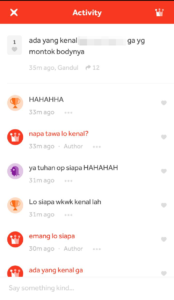The proliferation of social media platforms and dating apps has given internet users in Indonesia many ways to make new connections. However, these new channels present a new danger: online harassment.
In 2015, Diana (a pseudonym) found the anonymous message-sharing platform Secret. Many of her high school friends were already using the app. Eager to join the hype, she made an account for herself. “I found the content quite interesting and similar to Twitter,” she told KrASIA. “It was all fun until a friend suddenly sent me some screenshots from the app.”
One showed a post from an unknown sender, with Diana’s Facebook profile photo. Accompanying the stolen picture was a salacious caption. Another screenshot was of a text post from the same sender, expressing lewd intentions toward Diana. There were also indecent comments from other users directed at her, most of which were rude and harassing in nature.

The sender asked whether anyone on the app knew Diana in real life, so she assumes they have never actually met her. “My friend then confronted the user through Secret’s private message feature. But we still don’t know their identity,” she said.
Diana eventually stopped using Secret because of the experience. The disturbance stopped, but the impact lasted longer. She became extremely cautious about venturing into new corners of the digital world, taking precautions to limit the people who can see her pictures on social media. She set her personal accounts to private, but still felt on edge. “Like there is someone monitoring all my social media accounts and it also made me very insecure. I couldn’t believe that there are strangers out there harboring perverted thoughts about me,” she said.
Whereas Diana managed to isolate herself from harassment, some other women have not been able to put a stop to their torment. Wanda (a pseudonym) has been terrorized through phone calls and text messages for the past two years.
It all started with a call from an unknown number. She answered the phone, but the caller refused to disclose his identity. “I couldn’t identify his voice either. I think he used a voice changer or something,” she said. “But weirdly enough, he knew all about me, like my full name and the university that I attended.”
Soon, these calls turned into vulgar messages and even requests for sex video chats. Wanda blocked him, but the harasser always returned, calling from new numbers. He even started harassing her closest friends and siblings. “It seems like he planted spyware on my phone, he knew the contacts of people I talked to, even ones that I rarely interacted with,” she said.
Fed up with the situation, Wanda tried to file a report with the Pekanbaru City Police. But the officers laughed at Wanda and taunted her with questions like, “Who harassed you? Stranger or your boyfriend? What do you want to do about it?” With no help from law enforcement, Wanda tried to solve the problem on her own. She installed the Truecaller app to identify the stranger’s identity, but to no avail.
“He bought new numbers after I blocked him, maybe they were used solely to terrorize me,” she said, “It’s been years. I don’t know what to do anymore.”
Indeed, there are ways to avoid being identified by applications such as Truecaller or GetContact, which are the go-to apps for checking unknown numbers. Truecaller allows users to delist their numbers, making them unsearchable in the app.
Inadequate law instrument for online harassment
Since 2017, the National Commission on Violence Against Women (Komnas Perempuan) has included research about online gender-based violence (KBGO) in their yearly report. It reflected the intensifying yet neglected threat against women in the digital era. KBGO covers 13 actions, such as trolling, non-consensual intimate image or video sharing (NCII), stalking, tech-enabled surveillance, doxxing, and impersonation.
In 2020, the commission recorded 659 KBGO cases, dominated by unwanted intimate images or video leaks. “There are various forms of KBGOs, and not all of them can be categorized as criminal activity,” said Ellen Kusuma, head of the KBGO subdivision of the Southeast Asia Freedom of Expression Network (SAFENet). “Indonesia’s law instrument is still not adequate to handle KBGO.”
Cases like Wanda’s phone stalker and the inappropriate online messages about Diana carry no legal consequences in the country and are not seen as a matter to be handled by law enforcement.
This usually results in victims seeking redemption through non-judicial methods. One of the most popular routes is case-spilling on social media, where victims name and shame the alleged perpetrators using their personal accounts. Some opt to share this information through anonymous or collective accounts.
This method echoes the #MeToo movement that made waves in 2018 when sexual assault survivors around the world shared their experiences on social media. If they can’t get justice from the judicial system, the logic goes, then at least the perpetrators will be socially sanctioned—canceled.
Case-spilling then became a new fixture in Indonesia’s social media scene. Several cases made into national media and the perpetrators were processed by the police. However, most other instances kicked up momentary outcry before they were overshadowed by other issues.
Poppy Dihardjo, a veteran in Jakarta’s advertising scene, decided to step up and generate a list of offenders mined from the case-spills. “I saw that even after victims spoke up, perpetrators can still live their lives as if nothing happened,” she told KrASIA. “That’s why I decided to start the No Recruit List, to make sure that they will experience the consequences of their actions.”
No place for offenders
Founded in March 2020, No Recruit List was originally Dihardjo’s solo project where she compiled reports of sexual harassment or violence. Now, she has a team of volunteers with various backgrounds, such as non-governmental organization workers and lawyers, who help run the project. They are divided into different sub-units that oversee incoming reports, investigation, and victim handling.
Companies’ human resources (HR) departments can use the list when conducting background checks for potential hires. “For many corporations, employees are assets. But if they are later exposed as sexual predators or rapists, then they will become a liability. Obviously, HR wants to avoid that,” Dihardjo said.

She receives case reports through a Google Form. New entries are downloaded and then deleted right away to prevent data leaks. Then, the team contacts the victim to verify their account and runs an investigation to compile evidence of harassment or even criminal behavior. NRL has encountered situations where alleged serial offenders had victims in multiple cities, and the team contacted NGOs that work to protect women in those areas to cross-reference their records.
Verifying one case takes around a month’s work, Dihardjo said. She is the only person who can access and edit the list of proven offenders, which is stored offline. Dihardjo does not share the complete list with companies, and companies must provide a strong reason to look up a name, but she does issue confirmation if a query leads to a hit.
“They have to do their own research first, like, ‘I saw a suspicious account on social media about this candidate. We want to check if they are on your list.’ If there’s no valid reason, we will not disclose any information,” she said.
Before taking action, the NRL team will follow up with the victim to ask about their goals and intentions. “Not all of them want to punish the perpetrators, some just want to seek help and counseling,” Dihardjo said.
But for serious offenses such as rape or serial harassment, the No Recruit List team will alert the perpetrator’s employer and provide proof of his violations.
So far, 17 companies have worked with the No Recruit List team; most are startups. Dihardjo claims that “several men” on the list lost job offers in Jakarta because of their inclusion. The fact that some companies are taking sexual harassment seriously gives her hope for a better future.
Inadequate laws to punish harassers
Indonesian law offers scant protection for victims of online harassment. Instead, it acts as a shield for purported perpetrators. The highly protested Information and Electronic Law (UU ITE), for example, accommodates alleged offenders by giving them the means to report victims for defamation. This puts victims and groups like No Recruit List in a tight spot, according to SAFENet’s Kusuma.
“Before case-spilling, victims or their advisors have to assess the risks, including the potential for the perpetrator to report them for defamation,” she said.
Kusuma urges the country’s lawmakers to take KBGO seriously and eliminate the laws that burden victims. The Indonesian government recently formed two teams to amend the UU ITE by either repealing the legislation or creating an implementation guide for the problematic articles.
As long as the law remains as is, it will be misused by perpetrators to inflict new layers of punishment on their victims. “We need a total reform to make sure that our law can tackle KBGO cases, not accommodate them,” Kusuma said.
This article is part of KrASIA’s “Tech in Culture” series, where the writers of KrASIA unpack how tech is changing the status quo across Asia.


